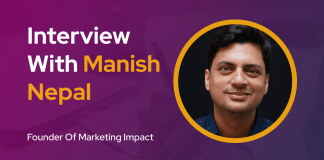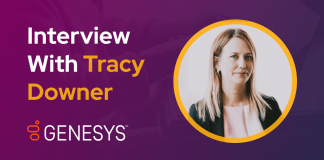Hi Martha, tell us about yourself and your background.
Thanks for asking! I got into customer experience by an all-too-common route. I was tired of lame, insane, and downright maddening experiences with companies.
But because my background is in science and operations, I knew that with the right metrics and measurement strategies, all companies could deliver exceptional customer experiences—and they could do so consistently over time. So, in 2004, I founded Interaction Metrics, a Customer Experience Consulting Company. I’m certified in Customer Experience (CCXP) and have my blackbelt in Six Sigma, the two most important certifications for the CX industry.
How did you start working in the customer experience space?
Arriving at customer experience was something that unfolded over time – because when you think about it, CX is not just about just one perspective or doing a survey. Instead, customer experience, like any experience, is about a range of personas, differing situations, as well as hundreds of emotional and conceptual cues. So, to be fully present in the CX space is to use multiple methods to examine CX from its many various perspectives.
Back in the early days of Interaction Metrics, we were mainly doing customer service evaluations. At the same time, we were having conversations with our clients about the drivers of customer satisfaction, which of course, goes way beyond the bounds of service. So, this expanded our methods into customer interviews.
Interviews are a unique method in that they are the only method that can explore the competitive landscape.
Grasping the marketplace of competitors is vital because, for customers, no company is an island; competitors are always part of the experience. The competition frames customers’ expectations and sets a bar to meet or exceed.
But interviews are time-consuming and require top-tier talent, making them expensive for clients, which is why we added another method: surveys. First, we used surveys to identify good interview subjects. But quickly, Employee Questionnaires, Net Promoter, Customer Satisfaction Tracking Studies… surveys took on a life of their own. These days we spend more time on surveys than any other single method.
But again, it’s the mix of methods, and aligning methods with objectives, that enables us to get to the heart of the customer experience space.
Can you tell us a bit about your current role?
It’s mostly about teamwork. Either I’m working with our team of analysts or our clients’ teams of customer success advocates.
With my internal team, I brainstorm the best survey questions, identify ways to increase survey response, develop text analytics frameworks, etc.
Working with our clients, I help them decide who should be surveyed, how we’ll do the sampling, what kinds of customer experience criteria to apply, and more.
But I always set aside time to educate on how a science-based approach to customer experience differs from just asking the Net Promoter question.
Providing education these days mostly comes through leading a zoom-based Customer Feedback Survey Workshop in which I put a real-life survey under the microscope. Attendees learn how to improve their feedback tools by seeing in real-time how I critique a survey’s successes, biases, and failures. I also lead our monthly B2B CXPA Roundtable, which you can learn about on the CXPA site.
I also contribute to the CX discipline through our syndicated blog and Science Tips newsletter. Basically, I am passionate about sharing ideas that can help all companies deliver exceptional customer experiences.
What is your top tip for companies that want to improve their CX strategy?
If I could only provide one tip, it would be to mastermind how your customer experiences end.
Research from Nobel Prize winner Daniel Kahneman and others shows that the ending to an experience is what we take away and remember. And a strong ending can cover for hiccups during an interaction. Keep in mind how you end an experience is not limited to tech support calls or order placement chats; ending on an uptick applies to surveys too. Lots of surveys peter out as soon as companies get the information they want. But that’s a downer and discourages customers from taking your survey again next quarter or next year.
Instead, make sure your final survey screen communicates sincere customer thanks. If you can, add a gift card or a priority code for upgraded service to demonstrate your appreciation. And if the survey captured complaints and questions, get back in touch with the customer to see if a resolution is possible. True, closed-loop survey communication is rare. You’ll make a favorable impression if you do it.
What is one common mistake that you see companies make when it comes to CX?
They don’t listen. Customers spend their valuable time explaining what they want, and then they don’t hear back. Customer Experience is a dialogue, not a monologue.
Can you tell us about a time that you had a really good experience with a company
as a customer?
I’d love to. However, I’ll start with a bad Bank of America experience because that gets me to the good. After 20 years with BOA, starting in March 2021, I had a series of awful interactions. As in AWFUL. I had a problem they couldn’t solve because they didn’t have a process in place to recognize the problem in the first place. Net net, I contacted Bank of America 27 times, and each time, I was passed from one representative to another, told I would get a callback, a promise that never materialized.
Most infuriating of all, four times, I was put in a 15-minute or longer phone queue only for the phone line to go dead. Finally, they solved the problem in a half-baked way, but they never apologized for the hassle and time I accrued.
So, I did what anyone would do, I cashed out my primary accounts and moved them to Chase. At Chase, not only did I get a warm welcome, but they also demonstrated their welcome by padding my accounts with hundreds of dollars. Everyone I have been in touch with at Chase has been sincerely friendly and has followed through in a timely way. Go Chase!
What are some CX solutions or tools that you’re keeping your eyes on right now?
I am constantly monitoring AI text analytics software, looking for ways to get even more efficient with unpacking the meaning of customer text. But for the level of accuracy and the kind of nuance we deliver, AI Text Analytics software is only a small part of the solution. I expect in 3-5 years, AI Text Analytics will be much more powerful and interesting.
What are your thoughts on AI-powered chatbots to handle customer support?
I’ve never asked a chatbot anything of consequence the chatbot was able to answer. Sure, a chatbot can answer, “What hours are you open?” But in 5 seconds, I can get that answer from Google too. At Interaction Metrics, we counsel our clients to frame their chatbots to clarify what they can and can’t answer from the outset. You don’t want your customers spending their precious time keying in questions only to get the equivalent of a blank stare.
What is your favorite CX metric?
Competitive Edge Score. It indicates where companies outperform their competitors. While it’s more complicated to calculate than Net Promoter Score, in many situations, it’s a more motivating and realistic metric. But Net Promoter, Customer Effort, Customer Satisfaction, Brand Compliance… they’re all valuable metrics when used in the right ways in the right contexts.
Any predictions for 2022 in the CX space?
I love that question because what could be more important than looking ahead! I have so many predictions, but I’ll give you two.
First, because survey fatigue and the overuse of surveys is increasingly real, I think companies will start embracing methods outside of surveys.
And second, if inflation continues to spiral upward, there will be pressure on companies to justify their price. This means customer experience will get a bigger, bolder seat at the table, because if you can provide an exceptional customer experience day in and day out—from one associate to the next—you suddenly get a lot fewer cost complaints.
However, predictions aside, what we now envision as wild science fiction will be commonplace in a future that’s coming sooner than we can imagine. The velocity of change is accelerating and inevitable.






